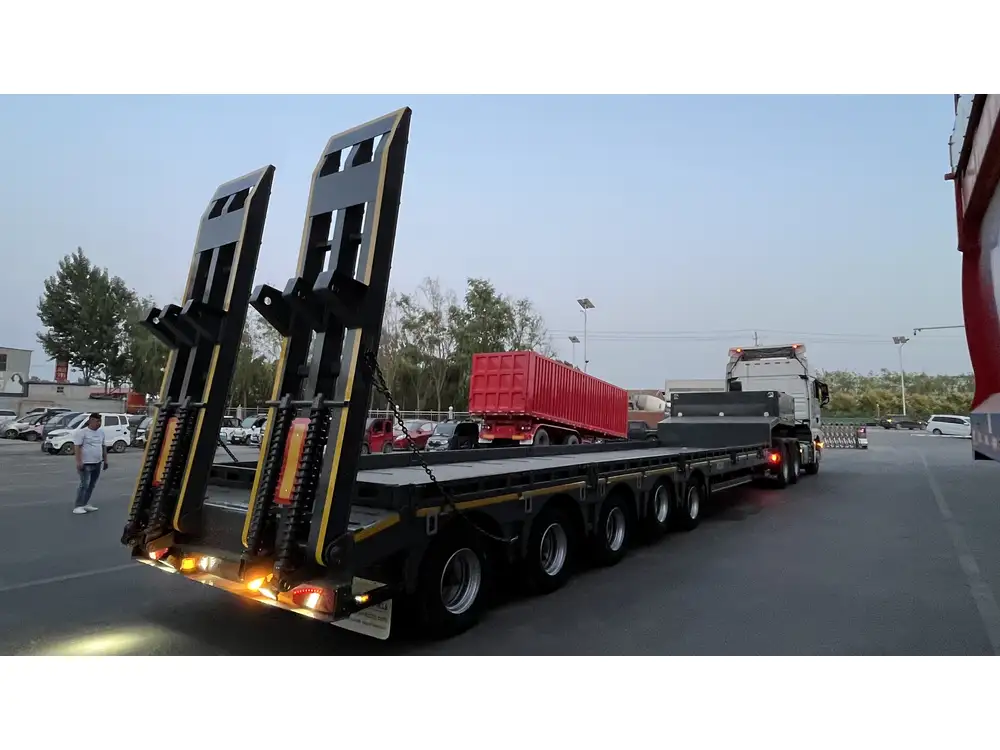In the realm of logistics and transportation, tanker trailers play a crucial role in the movement of liquids, ranging from fuels to food-grade materials. The question of how many gallons a typical tanker trailer holds is not just a matter of capacity; it encompasses a myriad of considerations related to regulatory standards, operational efficiency, and safety.
Overview of Tanker Trailers
Tanker trailers are specialized vehicles designed for the transportation of liquids. Depending on their intended use, they can be crafted from various materials—commonly aluminum or stainless steel—and come in varying shapes and sizes. The capacity, which is vital for any fleet operator, can greatly affect operational costs, delivery times, and compliance with safety regulations.
Types of Tanker Trailers
Understanding the types of tanker trailers is imperative when gauging their capacities. Here are a few types with their respective characteristics:
| Type of Tanker Trailer | Common Use | Typical Capacity (Gallons) |
|---|---|---|
| Fuel Tanker | Transportation of diesel, gasoline, and similar fuels | 8,000 – 11,000 |
| Food-Grade Tanker | Carrying edible liquids (like milk or juice) | 5,000 – 7,000 |
| Chemical Tanker | Transporting hazardous and non-hazardous chemicals | 5,000 – 10,000 |
| Water Tanker | Supplying potable or non-potable water | 4,000 – 6,000 |

Factors Influencing Tanker Trailer Capacity
Material Construction: The material from which the tanker is made not only affects durability but also impacts its overall weight and therefore the volume of liquid it can carry.
Design and Shape: Tankers are designed either as single or multi-compartment tanks, where multi-compartment designs can lead to decreased capacity per compartment but allow for the transport of different liquids simultaneously.
Regulatory Standards: There are legal limitations imposed by various governments concerning the maximum capacity of tanker trucks to ensure safety and environmental protection.
Weight Limitations: Trucks are subject to weight limits which can cap the capacity of the tanker trailer they can haul, irrespective of the tank’s size.
How Many Gallons Does a Typical Tanker Trailer Hold?
The standard capacity varies considerably based on the type and configuration of the tanker trailer. Generally, most tanker trailers can hold between 5,000 to 11,000 gallons. Here’s a breakdown:
Fuel Tankers: As mentioned, these typical tankers hold approximately 8,000 to 11,000 gallons of fuel. The most common configuration for long-haul trucking operations features multi-compartment tanks, allowing for the transport of different fuel grades without contamination.
Food-Grade Tankers: These tankers, crucial for transporting consumable liquids, have capacities ranging from 5,000 to 7,000 gallons. Compliance with stringent health regulations necessitates elaborate cleaning procedures, which can limit volume capabilities.
Chemical Tankers: Transporting hazardous materials necessitates a careful balance of volume and safety. Capacities usually span 5,000 to 10,000 gallons depending on the tanker’s design.
Water Tankers: In situations requiring the supply of water for various uses, from fire suppression to municipal supply, these trailers usually hold between 4,000 to 6,000 gallons.
How to Choose the Right Tanker Trailer Capacity
Selecting the appropriate tanker trailer capacity hinges on several determinants, ranging from the nature of the liquid being transported to logistical considerations such as route planning and delivery schedules. Here’s a guide:

1. Understand Your Product
Before making any decisions, it’s essential to have a clear understanding of the weight, density, and volumetric considerations of your liquid product. Different liquids not only differ in volume but also in weight, affecting how much can be safely transported.
2. Evaluate Transportation Needs
Assessing both short- and long-term transportation needs can indicate whether investment in larger capacity trailers may result in operational efficiencies, particularly in cost savings related to fuel and labor.
3. Regulatory Compliance
Staying informed about local regulations governing tanker capacities can prevent potential penalties. Different regions may impose varying limits on the total weight, impacting how much liquid can be safely transported.

4. Consider Weight Limits
Tanker trailers must comply with federal and state weight limitations, a factor that can significantly influence your capacity choice. Including the weight of the tanker itself and the cargo, you should ensure the total doesn’t exceed legal thresholds.
Common Examples of Tanker Trailers and Their Capacities
| Tanker Model | Capacity (Gallons) | Special Features |
|---|---|---|
| Wabash National Fuel Tanker | 11,600 | Multi-compartment, lightweight design |
| Fruehauf Food Grade Tanker | 6,000 | Stainless steel construction, FDA compliant |
| Great Dane Chemical Tanker | 10,000 | Enhanced safety features, custom fittings |
| Titan Water Tanker | 5,000 | Built for mobility, compact, stress-tested for high water weight |
Maintenance and Safety Considerations
Regardless of capacity, all tanker trailers require diligent maintenance to ensure safe operation. Here are some critical maintenance pointers:
Regular Inspections: Daily checks before leaving for a delivery can prevent larger issues from developing.
Cleaning Protocols: For food-grade and chemical tankers, adhering to rigorous cleaning protocols is essential to avoid contamination.
Leak Testing: Fluid integrity checks are vital, especially for chemical tankers. These tests can uncover potential leaks that may not be immediately visible but can have significant safety implications.
Pressure Regulation: For certain types of cargo, particularly fuels, monitoring for pressure build-up is crucial, as fluctuations can lead to dangerous situations.

Conclusion: Maximizing the Utility of Your Tanker Trailers
In summary, the capacity of a typical tanker trailer can range broadly—generally between 4,000 to 11,000 gallons—dependent upon the specific type of tanker and its intended use. Logistics operators should carefully consider the distinct characteristics of their cargo, regulatory demands, and overall transportation logistics when selecting appropriate tanker trailers. Emphasizing safety, maintenance, and operational efficiency ensures not only compliance but also maximizes productivity in the liquid transportation sphere.
This comprehensive overview underscores the complexities surrounding tanker trailer capacities, illustrating that choosing the right equipment is as much about meticulous planning as it is about logistics. Now equipped with this knowledge, fleet operators can make informed decisions that bolster their operational success in the liquid transportation industry.



